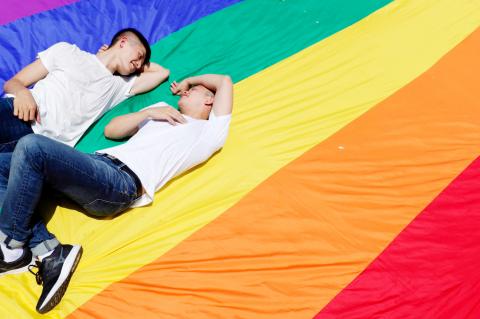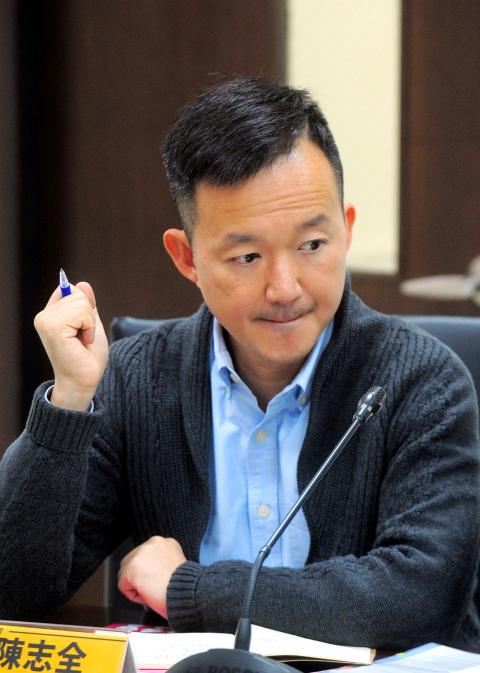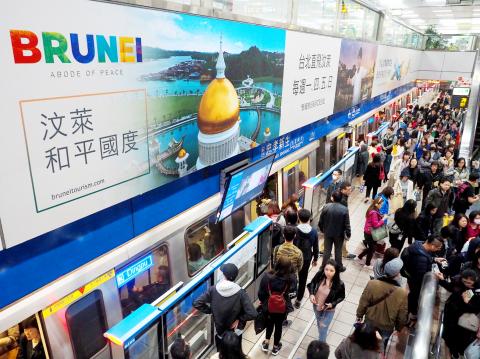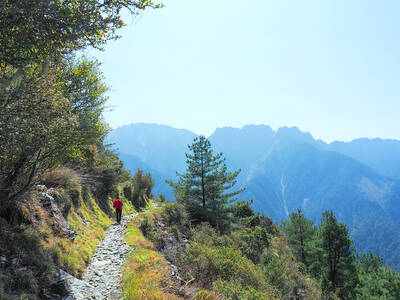In a tragicomic contrast of circumstances, while gay and lesbian couples planned their newly legal weddings last week, Hong Kong’s LGBT community woke up to news that the airport and subway authorities had banned an advertisement depicting a gay couple holding hands.
“Taiwan and Hong Kong have much in common,” says Raymond Chan (陳志全), the first openly gay lawmaker in the Hong Kong Legislative Council, citing the dominant Chinese ethnicity and “freedom of speech and the Internet.”
Yet social acceptance and legal recognition of same-sex partners have remained elusive.

Photo: EPA
In East and Southeast Asia, local activists view Taiwan’s achievement of marriage equality as a heartening and instructive development. That’s even as they are reminded of the distance that remains to claim such a reality for themselves.
AN INSPIRATION
In an op-ed for The Washington Post on May 20, Jennifer Lu (呂欣潔), chief coordinator of Marriage Equality Coalition Taiwan, drew attention to the far-reaching implications of Taiwan’s same-sex marriage legislation.

Photo: Wang I-sung, Taipei Times
The legislation “sends an important message to the world: that the [LGBT] community is not intruding into Asian cultures, and [LGBT] rights can coexist peacefully with traditional Asian values,” she wrote.
Taiwan’s decision is a de facto refutation of a common refrain, used by many governments and people who oppose LGBT rights, that such rights contradict the values fundamental to Asian countries.
“In the past, many opponents of same-sex marriage used cultural differences as an excuse, saying that same-sex marriage is a Western product and unfit for Chinese society,” Chan says.

Photo: EPA
“Taiwan’s successful example makes this false reasoning collapse in and of itself,” he continues.
Last November, a motion raised by Chan urging the government to consider granting greater rights to same-sex couples was voted down 27 to 24 in Hong Kong’s Legislative Council.
Yet a study by the University of Hong Kong last July found that over 50 percent of respondents approved of same-sex marriage, with even more supporting the rights of same-sex partners in specific matters like hospital visitation, housing and inheritance.

Photo: EPA
It is unlikely that the government will proactively move to ensure marriage equality. Taiwan’s success can therefore be influential in rousing Hong Kong’s LGBT community to secure their rights through judicial review, Chan says.
With more Hong Kongers in same-sex relationships getting married overseas, Chan is also hopeful that they will return determined to secure equal recognition.
A legal challenge remains in the form of a case brought by gay civil servant Angus Leung (梁鎮罡) against his employer. Leung, who married his husband in New Zealand, has sued for the same spousal benefits that the government grants to heterosexual married couples.
OR A DISTRACTION?
To LGBT activists in Southeast Asia, Taiwan’s decision also “sends a ray of optimism” demonstrating that “structural changes can happen,” says Ryan Silvero, regional coordinator of the ASEAN Sexual Orientation, Gender Identity and Expression (SOGIE) Caucus.
But the picture is more complicated.
“One concern is that Taiwan’s success may distract us activists from the bigger human rights struggles we face,” Silvero says.
The diverse region has seen highs and lows in the span of just a few years.
In 2015, Vietnam lifted a ban on same-sex marriage, although it stopped short of legal recognition or protection of such unions. Thailand’s cabinet endorsed a bill allowing same-sex civil partnerships late last year, and the new parliament is set to deliberate it.
But elsewhere, being a sexual minority can lead to a literal life-and-death situation.
Last month, Brunei decreed sex between men punishable by stoning to death, and sex between women punishable by caning or imprisonment. The decision prompted a global outcry, to which Brunei responded by keeping the laws in place but saying that it would not enforce the death penalty.
In Malaysia and Singapore, homosexuality remains a criminal offense. Not so in Indonesia, but public canings of men and women accused of same-sex relations are routinely carried out in conservative parts of the country.
“Yes, marriage equality is a key human right,” Silvero says, but LGBT communities face other pressing and complex concerns like “economic marginalization, repressive laws, increasing extremist views” and even hate attacks on activists.
Even as Southeast Asia’s LGBT activists focus on these issues, they look to Taiwan for vital lessons in successful movement-building and collective advocacy.
The ASEAN SOGIE Caucus maintains ties with the Taiwan Tongzhi Hotline Association (台灣同志諮詢熱線協會) and Victoria Hsu (許秀雯), chairperson of the Taiwan Alliance to Promote Civil Partnership Rights (台灣伴侶權益推動聯盟).
Recalling past exchanges with Taiwanese activists, Silvero says a key lesson that emerged was that “no single group owned the process and outcome” of marriage equality. Rather, efforts were painstakingly coordinated among multiple stakeholders.
Silvero also points to the importance of community organization. Despite a setback when voters in last November’s referendum rejected amending the Civil Code to ensure same-sex marriage, Taiwan’s LGBT community was able to persist in lobbying because of its strong and vocal grassroots constituency.
For now, the celebrations are tinged with a determination to get down to business.
“We celebrate in solidarity” with Taiwan, Silvero says, but remain “mindful of an ongoing and complex struggle we have to overcome.”
“I firmly believe that one day, Hong Kong’s LGBT people will also be able to love courageously on our own land, get married openly and honorably and receive the protection of the law,” Chan says.

“Why does Taiwan identity decline?”a group of researchers lead by University of Nevada political scientist Austin Wang (王宏恩) asked in a recent paper. After all, it is not difficult to explain the rise in Taiwanese identity after the early 1990s. But no model predicted its decline during the 2016-2018 period, they say. After testing various alternative explanations, Wang et al argue that the fall-off in Taiwanese identity during that period is related to voter hedging based on the performance of the Democratic Progressive Party (DPP). Since the DPP is perceived as the guardian of Taiwan identity, when it performs well,

The Taiwan People’s Party (TPP) on May 18 held a rally in Taichung to mark the anniversary of President William Lai’s (賴清德) inauguration on May 20. The title of the rally could be loosely translated to “May 18 recall fraudulent goods” (518退貨ㄌㄨㄚˋ!). Unlike in English, where the terms are the same, “recall” (退貨) in this context refers to product recalls due to damaged, defective or fraudulent merchandise, not the political recalls (罷免) currently dominating the headlines. I attended the rally to determine if the impression was correct that the TPP under party Chairman Huang Kuo-Chang (黃國昌) had little of a

At Computex 2025, Nvidia CEO Jensen Huang (黃仁勳) urged the government to subsidize AI. “All schools in Taiwan must integrate AI into their curricula,” he declared. A few months earlier, he said, “If I were a student today, I’d immediately start using tools like ChatGPT, Gemini Pro and Grok to learn, write and accelerate my thinking.” Huang sees the AI-bullet train leaving the station. And as one of its drivers, he’s worried about youth not getting on board — bad for their careers, and bad for his workforce. As a semiconductor supply-chain powerhouse and AI hub wannabe, Taiwan is seeing

Jade Mountain (玉山) — Taiwan’s highest peak — is the ultimate goal for those attempting a through-hike of the Mountains to Sea National Greenway (山海圳國家綠道), and that’s precisely where we’re headed in this final installment of a quartet of articles covering the Greenway. Picking up the trail at the Tsou tribal villages of Dabang and Tefuye, it’s worth stocking up on provisions before setting off, since — aside from the scant offerings available on the mountain’s Dongpu Lodge (東埔山莊) and Paiyun Lodge’s (排雲山莊) meal service — there’s nowhere to get food from here on out. TEFUYE HISTORIC TRAIL The journey recommences with